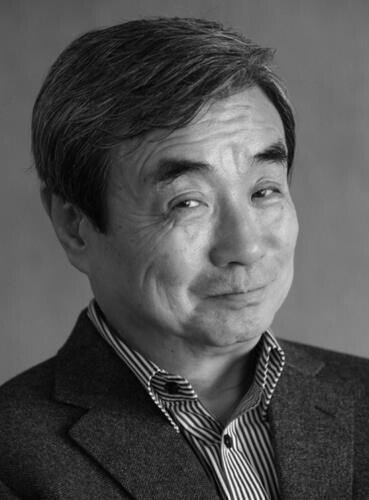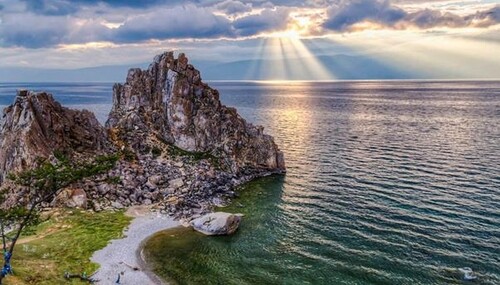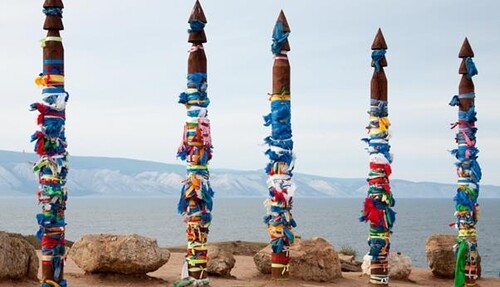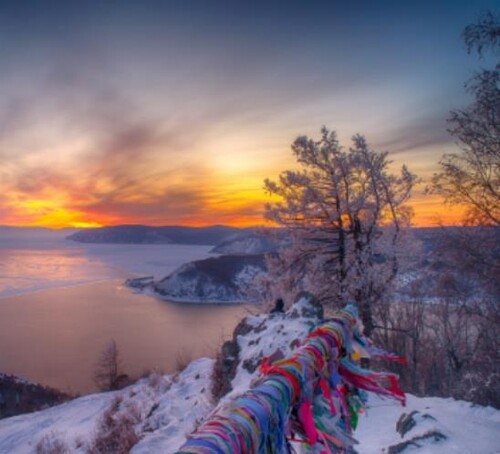
We arrived at the Burkan Rock on Lake Baikal.
This is the sacred mountain rock that all shamans in the world are said to have prayed to. In Buryat, Baikal means "the sea of the gods."
So, the island of Olkhon (Ольхон), known as the "navel of Baikal," would indeed be the navel of the god’s sea, and the Burkan Rock, where the energy of this island converges, should naturally be called "the god’s rock."
 |
| ▲ This image of Burkhan Rock of Lake Baikal is captured from the Travel Baikal website. (PHOTO NOT FOR SALE) (Yonhap) |
Some of our group even brought ceremonial hats (Yugwan) and ritual offerings from Seoul, performing a ritual with ancestral prayers (Goyu-mun) and incense, just like an offering at a shrine, while also conducting a water-mixing ceremony between Seoul’s water and Baikal’s.
The comfort we all feel here, however, is probably due to the familiar surroundings — the ducks leisurely swimming on the water, the geese flying across the sky, the seagulls, swallows — all these are too familiar to us.
Moreover, the stone piles at various places stop people in their tracks, and on the hills and rocks, colorful pieces of cloth are tied, making wishes just like the sacred tree at a village shrine on our hometown's hills.
It almost feels like, on the shores, the "shaman" Grandma Kim Geumhwa is about to cleanse our spirits with a ritual bath, as if washing away our hearts.
 |
| ▲ This image of Shamanka Rock of Lake Baikal is captured from the Travel Baikal website. (PHOTO NOT FOR SALE) (Yonhap) |
The water is truly clear. Divers say you can clearly see down to 40 meters. And there’s a saying that bathing in this water will make you three years younger each time. However, the older members of the group don’t pay much attention to such talk. They simply roll up their pants and dip their feet in.
The youngest among us, Na-Mo, quietly walked down the hill and jumped straight into the water, swimming leisurely for a while before coming back ashore. People looked on in surprise, but no one said a word. It is a privilege only young people have. By now, she has probably turned back from 29 years old to 26.
Now that I think about it, she looked even more beautiful after coming out of the water. From afar, I could hear the sound of camera shutters clicking as she emerged from the water. To me, it sounded like the sound of swallowing saliva.
Sitting here and gazing endlessly at this vast, clear water, I began to feel that everything in the world is meaningless.
How often do we agonize, cry, fight, and harm others over trivial matters?
How often do we risk our lives for small gains? How often do we obsess over trivial losses?
That water seemed to be telling me to forget all those things. After seeing the calm, vast, and boundless water, if I were to think about those trivial quarrels again, it would be too persistent. In short, it would be obsession.
In this "sea," one must witness the sunset. In the northern countries, you had to wait a long time for the sun to set.
As the sky darkened, we thought the sun was setting, but to actually see it dip below the horizon, we had to wait a long time. The entire sky turned crimson, and that red sky spread across the 'sea' like a raging fire. Then, the silhouette of the black mountain stood tall against the red backdrop in stark contrast. We had to witness the sunrise as well. It was a brilliant sunrise.
After seeing the sun, one must also see the moon and stars. Since there was no light around, the starlight was all the brighter.
With only the deep blue water visible, even the tiniest light didn’t enter our sight. Here, it felt as if time itself had stopped with us sitting here.
 |
| ▲ This image of Sunset over Lake Baikal is captured from the Travel Baikal website. (PHOTO NOT FOR SALE) (Yonhap) |
I too felt as if I were a Zen master.
"The green mountains tell me to live silently, and the vast sky tells me to live without blemish. Let go of greed, let go of anger, and live like the water and the wind, freely and without attachment."
Leaving the shaman's rock, we piled into an old Soviet military vehicle called an "UAZ." It was a rugged, van-shaped vehicle that could hold about ten people. The wheels were large, and the body sat high above them, giving it an odd appearance.
However, it was powerful on such rough terrain. In the past, this vast, fertile grassland was the largest open space in the world, where people could only travel on horseback. It was a land that only nomadic horse riders could inhabit.
Then, it was the cavalry of Genghis Khan’s army on their horses who drove those nomads out. It is said that Genghis Khan—or rather, the young Temüjin—was born in a village called Burkan, which is nearby, and that he was buried in this area after his death.
This place is also said to be the maternal home of Temüjin’s mother. Since this land once belonged to the Mongol Empire at its peak, it’s possible.
It remains a historical mystery that no one has yet uncovered, and the fact that the burial site of one of the most prominent heroes in world history is still unknown speaks to the impermanence of time and human life.
The stoic Russian driver of the UAZ didn’t mind the dust flying up from the car ahead and simply followed closely behind. The dust was so thick that we couldn’t see in front of us. Despite this, the one-hour trip through the northern part of Olkhon Island turned out to be a great journey, allowing us to fully enjoy the scenery of Lake Baikal.
(C) Yonhap News Agency. All Rights Reserved























